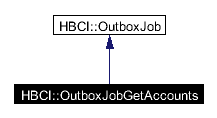
#include <outboxjobs.h>
Inheritance diagram for HBCI::OutboxJobGetAccounts:

Public Methods | |
| OutboxJobGetAccounts (Pointer< Customer > c) | |
| ~OutboxJobGetAccounts () | |
| bool | createHBCIJobs (Pointer< MessageQueue > mbox, int n=0) |
| bool | evaluate () |
| bool | commit (int msgNumber=HBCI_COMMIT_WHOLE_JOB) |
| string | description () const |
| JobProgressType | type () const |
| list< int > | resultCodes () const |
This job updates the list of accounts for a customer, if necessary. In fact this job does NOTHING ;-) All this job is supposed to do is done by HBCIAPI.
|
|
|
|
|
|
|
|
Call this method to commit changes to the system. Since Jobs do not change the system you may call this method to commit the changes. A job for getting the balance for example may decide to store the retrieved balance in the corresponding account.
Implements HBCI::OutboxJob. |
|
||||||||||||
|
Let the job create the "real" jobs and add them to the message queue given.
Implements HBCI::OutboxJob. |
|
|
Return a short description of what the job is supposed to do.
Implements HBCI::OutboxJob. |
|
|
Let the job check the result and set the flags. Let the job check the result. This means checking the results of all Jobs involved (which otherwise is not done automatically). This method sets its status and result accordingly -- otherwise the status and result flags might not be up-to-date.
Implements HBCI::OutboxJob. |
|
|
Returns a list of result codes of this job. This can be used to get more detailed information if the result of this job was HBCI_JOB_RESULT_FAILED. In that case, you can traverse this list, checking for resultcodes >= 9000. Each of those can be the source of the job failure, so you can react accordingly. HBCI spec suggests that the most important of them can be found at the front() already, but that depends on your bank. Note: A resultcode >= 9000 does not automatically mean an error, see MessageQueue::getResult().
Implements HBCI::OutboxJob. |
|
|
Return the JobProgressType of this job.
Implements HBCI::OutboxJob. |
 1.2.17
1.2.17